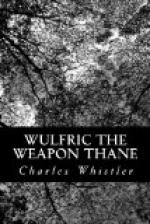“But, as I live, hither comes something from the open sea!”
I rose up and looked to where he showed me, and as the ship rose to a great wave, far off I saw a dark speck among white-crested rollers, that rose and fell, and came ever nearer, more swiftly than wreckage should.
Now some of the men who clustered under the shelter of the fore deck, with their eyes ever on us, rose up from their places and began to look out seaward over the bows through the spray to find out what we watched, and ere long one man called to his mates:
“Ho, comrades, here comes flotsam from the open sea!”
Slowly the men rose up one by one and looked, clustering round the stem head, and a little talk went round as to what this might be.
“It is a bit of wreck,” said one.
“Hardly, for the gale has not been wild enough to wreck a ship in the open; ’tis maybe lumber washed from a deck,” answered another.
“It is a whale—no more or less.”
“Nay,” said old Kenulf; “it behaves not as a whale, and it comes too swiftly for wreckage.”
“Would it were a dead whale. Then would be profit,” said another man again, and after that the men were silent for a long while, having said all that could be guessed, and watched the speck that drew nearer and nearer, bearing down on us.
At last my father, ever keen of sight, said to me:
“This thing is not at the mercy of wind and wave. Rather has it the rise and fall of a boat well handled. Yet whence should one come in this heavy sea, after three days’ gale?”
Even as he spoke, old Kenulf growled, half to himself, that to his thinking this was a boat coming, and handled, moreover, by men who knew their trade. Thereat some of the men laughed; for it seemed a thing impossible, both by reason of the stretch of wild sea that so small a craft as this—if it were indeed a boat—must have crossed, and because the sea was surely too heavy to let one live.
Yet in the end we saw that it was a boat, and that in her, moreover, was but one man, whose skill in handling her was more than ours, and greater than we could deem possible.
Whereupon some of us were afraid, seeing how wondrously the tiny craft came through the swift seas, and a man called out, giving voice to our fears:
“Surely yon man is a Finn and the wizard who has raised this storm to drown us; now are we lost!”
And I—who had listened eagerly to all the wild stories of the seamen, since first I was old enough to wander curiously over the ships from overseas that put into our haven on their way up the great rivers to Norwich, or Beccles, or other towns—knew that the Finns have powers more than mortal (though how or whence I know not) over wind and sea, often using their power to the hurt of others, and so looked to see the lines of a great squall, drawn as it were astern of the wizard’s boat, whitening as it rushed upon us to sink us in sight of home.




